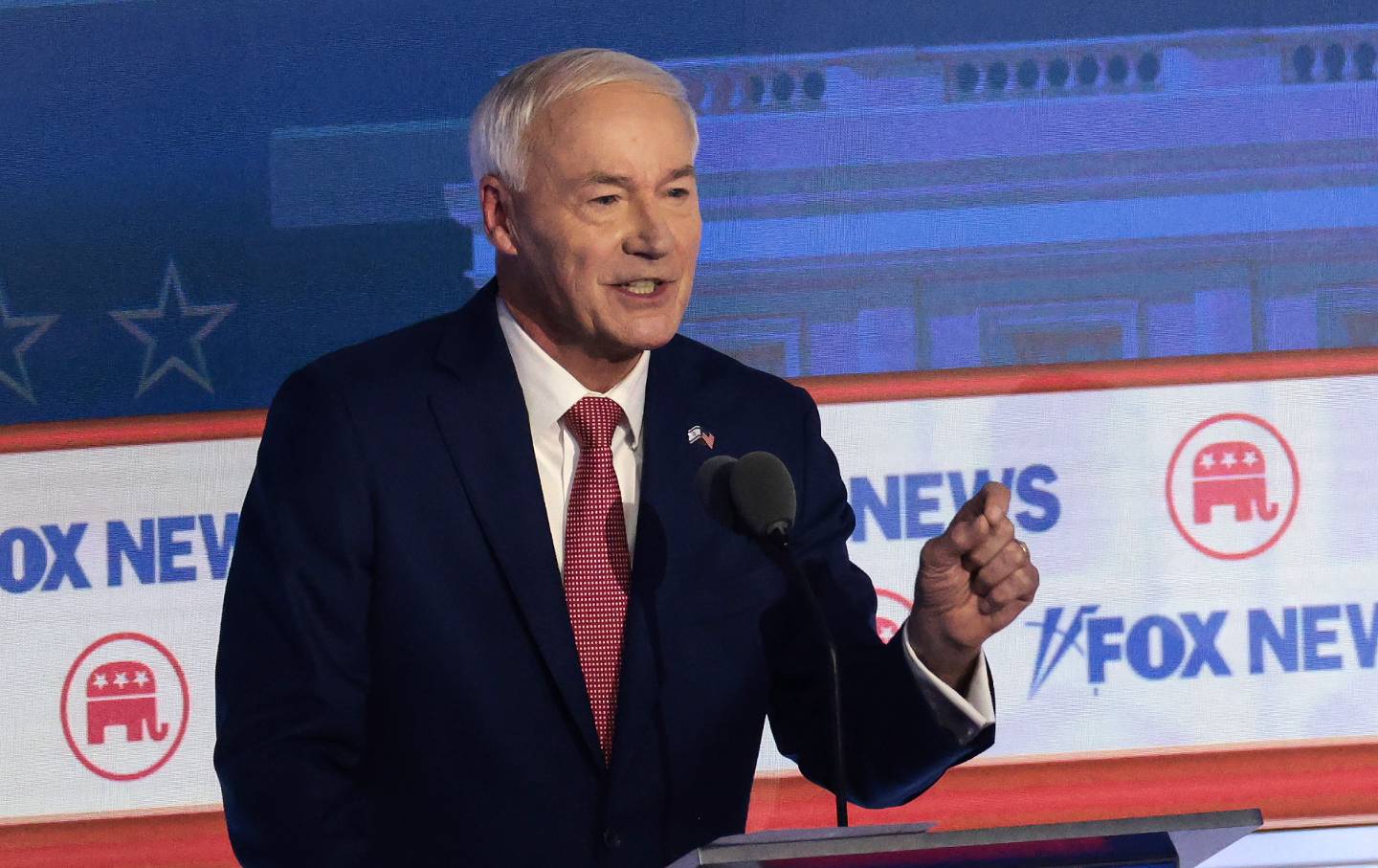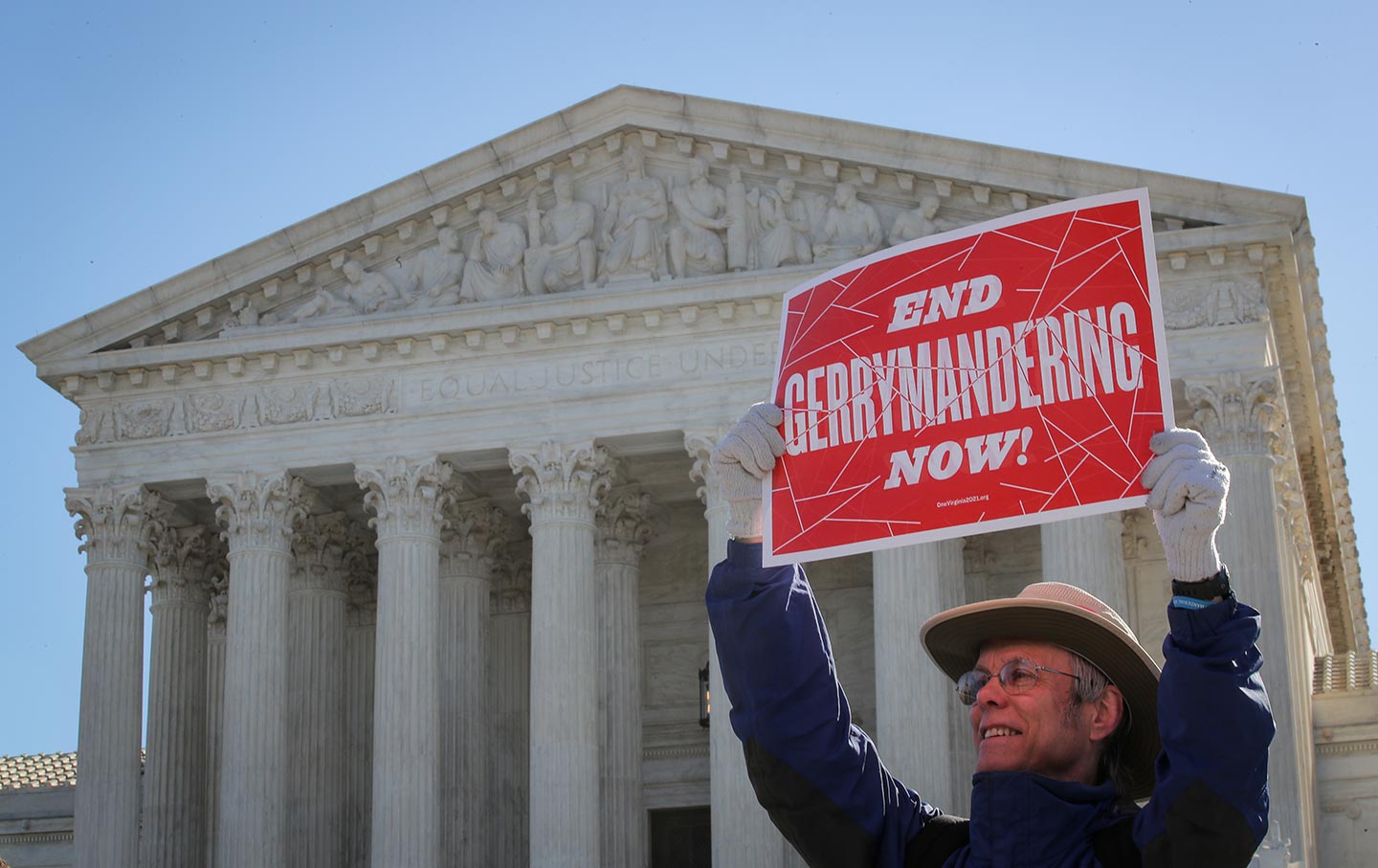The Conservatives Who Read the Constitution— and Found It Disqualifies Trump
Asa Hutchinson is the only Republican presidential candidate with the courage to discuss the 14th Amendment.

Asa Hutchinson at the Republican presidential debate in Milwaukee on August 23, 2023.
(Win McNamee / Getty Images)Former New Jersey governor Chris Christie explained to a disapproving crowd at the first 2024 Republican presidential debate why he could not support 91-times-indicted former president Donald Trump as the next GOP presidential nominee.
“Someone’s got to stop normalizing this conduct,” Christie said midway through last week’s desultory gathering of the Republicans who would like to be seen as credible alternatives to Trump. “Whether or not you believe that the criminal charges are right or wrong, the conduct is beneath the office of president of the United States.” Cautiously worded as the statement was, it drew boisterous boos from the audience of 4,000 Republicans that assembled for the debate, giving Christie an opportunity to deliver a prepackaged admonition. “This is the great thing about this country,” he said. “Booing is allowed, but it doesn’t change the truth.”
That was good theater, and Christie knew it. He parlayed the exchange into a round of post-debate television appearances where he awarded himself many kudos for his insight and courage.
But the candidate at the debate who actually said something of consequence regarding presidential accountability eschewed such glib punchlines.
Instead, former Arkansas governor Asa Hutchinson calmly explained that he could not pledge to back Trump in 2024 because ”I’m not going to support somebody who’s been convicted of a serious felony or who is disqualified under our Constitution.”
That mention of disqualification was a reference to the 14th Amendment to the US Constitution, which was added after Southern states revolted against the republic in the Civil War. Section 3 of the amendment reflects on officials who support insurrection and rebellion and explicitly declares:
No person shall be a Senator or Representative in Congress, or elector of President and Vice-President, or hold any office, civil or military, under the United States, or under any State, who, having previously taken an oath, as a member of Congress, or as an officer of the United States, or as a member of any State legislature, or as an executive or judicial officer of any State, to support the Constitution of the United States, shall have engaged in insurrection or rebellion against the same, or given aid or comfort to the enemies thereof. But Congress may by a vote of two-thirds of each House, remove such disability.
Hutchinson served as the youngest US Attorney in the country under President Ronald Reagan, managed more than 100 high-profile jury trials, and made headlines trying white supremacists in the 1980s, before serving in Congress, holding several posts in the Bush administration, and getting himself elected to two terms as a Republican governor. He’s an economic and social conservative who twice backed Trump for the presidency. But unlike a lot of Republicans who call themselves “constitutional conservatives,” Hutchinson has actually read the Constitution and takes seriously the scholarship of conservative legal experts like William Baude of the University of Chicago Law School and Michael Stokes Paulsen of the University of St. Thomas Law School, who argue in a forthcoming University of Pennsylvania Law Review article, “The Sweep and Force of Section Three”:
First, Section Three remains an enforceable part of the Constitution, not limited to the Civil War, and not effectively repealed by nineteenth century amnesty legislation. Second, Section Three is self-executing, operating as an immediate disqualification from office, without the need for additional action by Congress. It can and should be enforced by every official, state or federal, who judges qualifications. Third, to the extent of any conflict with prior constitutional rules, Section Three repeals, supersedes, or simply satisfies them. This includes the rules against bills of attainder or ex post facto laws, the Due Process Clause, and even the free speech principles of the First Amendment. Fourth, Section Three covers a broad range of conduct against the authority of the constitutional order, including many instances of indirect participation or support as “aid or comfort.” It covers a broad range of former offices, including the Presidency. And in particular, it disqualifies former President Donald Trump, and potentially many others, because of their participation in the attempted overthrow of the 2020 presidential election.
Former US Court of Appeals judge J. Michael Luttig, a leading conservative, shares this view, explaining in a recent interview that, no matter what comes of Trump’s many trials, the former president can be bumped from the ballot by state election officials, because “no legislation by Congress or judicial decision or any other finding in a court of law—by virtue of a conviction in a criminal trial, for instance—is necessary for the clause to operate against someone who has previously taken an oath to support the Constitution of the United States and thereafter engaged in insurrection or rebellion against the Constitution of the United States.”
These clear readings of the 14th Amendment echo the interpretation of US Representative Jamie Raskin, the Maryland Democrat and former law professor who led the effort to convict Trump following the former president’s 2021 impeachment. With regard to the 14th Amendment’s standard for disqualification, Raskin says Trump “really does fulfill exactly the constitutional prohibition there.”
The debate about the disqualification of Trump has become a live issue in recent months. As the former president’s legal troubles have mounted, watchdog groups such as Citizens for Responsibility and Ethics in Washington and Free Speech for People have been urging state officials to apply the 14th. This summer, letters from Free Speech For People and the voting rights ground Mi Familia Vota Education Fund urged secretaries of state and chief election officials in nine states to recognize that “the qualifications for eligibility for the presidency—in addition to natural-born citizenship, age, and residency—have also included not having engaged in insurrection against the United States after having taken an oath to support the Constitution. And Trump does not meet that qualification.”
This is what Hutchinson was talking about in the contentious section of the debate that came after Fox News host Bret Baier said: “You all signed a pledge to support the eventual Republican nominee. If former president Trump is convicted in a court of law, would you still support him as your party’s choice? Please raise your hand if you would.”
Most of the attention to the responses to that question focused on a fierce exchange between Christie and Trump defender Vivek Ramaswamy, but it was Hutchinson who went to the heart of the matter when he said:
I did not raise my hand because there’s an important issue we as a party have to face. And well over a year ago, I said that Donald Trump was morally disqualified from being President, again, as a result of what happened on January 6th. More people are understanding the importance of that, including conservative legal scholars, who says he may be disqualified under the 14th Amendment from being President, again, as a result of the insurrection. This is something that could disqualify him, under our rules, and under the Constitution. And so obviously, I’m not going to support somebody who’s been convicted of a serious felony, or who has this is disqualified under our Constitution. And that’s consistent with RNC rules. And I hope everybody would agree with that.
They didn’t. Hutchinson was booed just as aggressively as Christie, and the chaotic debate carried forward. But, for a brief moment, the Republicans in Milwaukee heard the voice of an actual constitutional conservative.
Disobey authoritarians, support The Nation
Over the past year you’ve read Nation writers like Elie Mystal, Kaveh Akbar, John Nichols, Joan Walsh, Bryce Covert, Dave Zirin, Jeet Heer, Michael T. Klare, Katha Pollitt, Amy Littlefield, Gregg Gonsalves, and Sasha Abramsky take on the Trump family’s corruption, set the record straight about Robert F. Kennedy Jr.’s catastrophic Make America Healthy Again movement, survey the fallout and human cost of the DOGE wrecking ball, anticipate the Supreme Court’s dangerous antidemocratic rulings, and amplify successful tactics of resistance on the streets and in Congress.
We publish these stories because when members of our communities are being abducted, household debt is climbing, and AI data centers are causing water and electricity shortages, we have a duty as journalists to do all we can to inform the public.
In 2026, our aim is to do more than ever before—but we need your support to make that happen.
Through December 31, a generous donor will match all donations up to $75,000. That means that your contribution will be doubled, dollar for dollar. If we hit the full match, we’ll be starting 2026 with $150,000 to invest in the stories that impact real people’s lives—the kinds of stories that billionaire-owned, corporate-backed outlets aren’t covering.
With your support, our team will publish major stories that the president and his allies won’t want you to read. We’ll cover the emerging military-tech industrial complex and matters of war, peace, and surveillance, as well as the affordability crisis, hunger, housing, healthcare, the environment, attacks on reproductive rights, and much more. At the same time, we’ll imagine alternatives to Trumpian rule and uplift efforts to create a better world, here and now.
While your gift has twice the impact, I’m asking you to support The Nation with a donation today. You’ll empower the journalists, editors, and fact-checkers best equipped to hold this authoritarian administration to account.
I hope you won’t miss this moment—donate to The Nation today.
Onward,
Katrina vanden Heuvel
Editor and publisher, The Nation
More from The Nation

The King of Deportations The King of Deportations
ICE’s illegal tactics and extreme force put immigrants in danger.

How Rob Reiner Tipped the Balance Against Donald Trump How Rob Reiner Tipped the Balance Against Donald Trump
Trump’s crude disdain for the slain filmmaker was undoubtedly rooted in the fact that Reiner so ably used his talents to help dethrone him in 2020.

The Economy Is Flatlining—and So Is Trump The Economy Is Flatlining—and So Is Trump
The president’s usual tricks are no match for a weakening jobs market and persistent inflation.

Trump’s Vile Rob Reiner Comments Show How Much He Has Debased His Office Trump’s Vile Rob Reiner Comments Show How Much He Has Debased His Office
Every day, Trump is saying and doing things that would get most elementary school children suspended.




